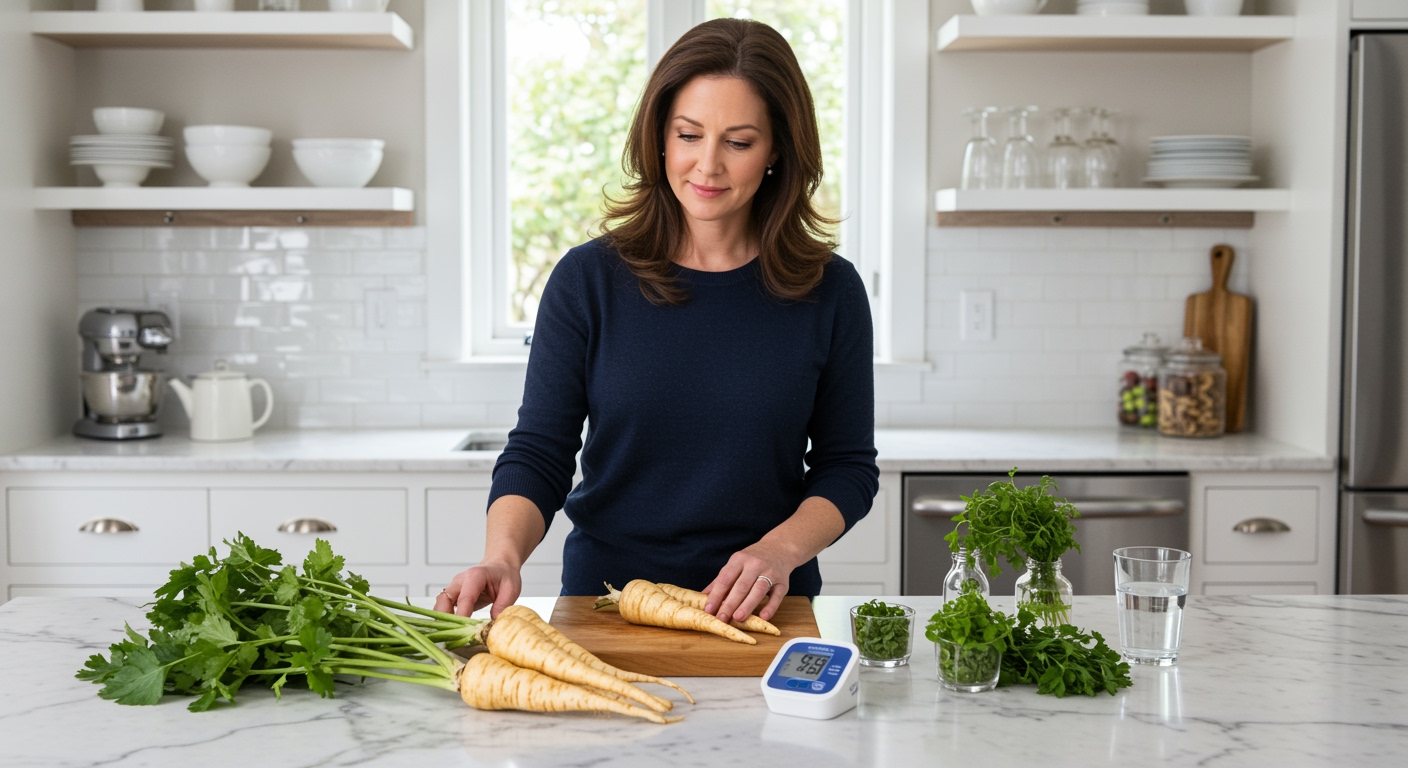✪ Key Takeaway: Wild parsnips contain potassium and fiber that may help lower blood pressure, but evidence remains limited.
Introduction
Wild parsnips look innocent enough, but could this humble root vegetable hold the key to naturally lowering your blood pressure?
You might be asking this question because you have heard whispers about certain vegetables having powerful effects on cardiovascular health, or perhaps your doctor suggested that dietary changes could help manage your blood pressure without medication.
Hi, I am Abdur, your nutrition coach, and today I am going to explain whether wild parsnips can actually lower your blood pressure and what the science really says about this root vegetable.
What Makes Wild Parsnips Different From Regular Parsnips?
Wild parsnips grow naturally without human cultivation and often contain higher concentrations of certain nutrients compared to their domesticated cousins.
These wild varieties typically have a more bitter taste and tougher texture because they develop stronger defense compounds to survive in harsh conditions.
The nutrient density in wild parsnips can be significantly higher, particularly for minerals like potassium and magnesium that play crucial roles in blood pressure regulation.
However, wild parsnips also contain higher levels of natural toxins called furanocoumarins, which can cause skin reactions when exposed to sunlight.
This means that while wild parsnips might offer more nutritional benefits, they also come with increased risks that you need to consider carefully.
✪ Note: Always properly identify wild parsnips before consumption as they can be confused with toxic plants.
How Do Parsnips Affect Blood Pressure?
Parsnips contain approximately 375 milligrams of potassium per 100 grams, which is a significant amount for supporting healthy blood pressure levels.
Potassium works by helping your kidneys remove excess sodium from your body through urine, which directly reduces the pressure on your artery walls.
The fiber content in parsnips, about 4.9 grams per 100 grams, also contributes to cardiovascular health by helping maintain healthy cholesterol levels.
When your blood vessels are less clogged with cholesterol deposits, your heart does not have to work as hard to pump blood, resulting in lower blood pressure readings.
Parsnips also contain folate, which helps your body produce nitric oxide, a compound that relaxes blood vessels and improves blood flow.
The natural sugars in parsnips are released slowly due to the fiber content, preventing the blood sugar spikes that can temporarily increase blood pressure.
✪ Fact: One cup of cooked parsnips provides about 12% of your daily potassium needs.
What Does The Research Say About Parsnips And Blood Pressure?
Currently, there are no specific studies that directly examine wild parsnips and their effects on blood pressure in humans.
Most research focus on the general benefits of potassium-rich vegetables for cardiovascular health rather than individual root vegetables like parsnips.
Studies show that increasing potassium intake from food sources can reduce systolic blood pressure by 3-4 mmHg in people with high blood pressure.
The DASH diet research, which emphasizes vegetables high in potassium, demonstrates that this approach can lower blood pressure as effectively as some medications.
However, parsnips were not specifically highlighted in these studies, so we cannot make direct claims about their unique blood pressure-lowering effects.
The limited research on wild parsnips focus more on their toxic compounds and safety concerns rather than their potential health benefits.
✪ Pro Tip: Focus on overall dietary patterns rich in potassium rather than relying on single foods for blood pressure control.
Are There Risks To Eating Wild Parsnips?
Wild parsnips contain furanocoumarins, natural compounds that can cause severe skin burns when combined with sunlight exposure.
Even touching wild parsnips and then going outside can result in painful blisters and dark scars that may last for months or years.
The concentration of these toxic compounds is much higher in wild varieties compared to cultivated parsnips you find in grocery stores.
Misidentification is another serious concern because wild parsnips can look similar to other plants, including some that are deadly poisonous.
People with kidney problems should be cautious about consuming large amounts of any high-potassium food, including parsnips, as it could lead to dangerous potassium buildup.
If you are taking blood pressure medications, adding significant amounts of potassium-rich foods could potentially cause your blood pressure to drop too low.
✪ Note: Always consult your doctor before making significant dietary changes if you take blood pressure medications.
Should You Choose Store-Bought Parsnips Instead?
Store-bought parsnips offer many of the same nutritional benefits as wild varieties without the safety risks and toxic compounds.
Cultivated parsnips still contain good amounts of potassium, fiber, and other nutrients that support cardiovascular health.
You can easily incorporate regular parsnips into your diet through roasting, mashing, or adding them to soups and stews.
The consistent quality and safety of store-bought parsnips make them a much more practical choice for regular consumption.
Regular parsnips are also more affordable and accessible, allowing you to include them as part of a balanced diet focused on blood pressure management.
Instead of seeking out potentially dangerous wild varieties, focus on eating a variety of potassium-rich vegetables that are safe and well-researched.
✪ Pro Tip: Combine parsnips with other heart-healthy vegetables like spinach, sweet potatoes, and beets for maximum benefit.
The Bottom Line
Wild parsnips may contain nutrients that could theoretically help lower blood pressure, but the risks far outweigh any potential benefits compared to safer alternatives.
Smart nutrition is about making choices that support your health without putting you in danger, and wild parsnips simply do not meet that standard for most people.
I would love to hear your thoughts about incorporating root vegetables into your diet for heart health, so please share your questions or experiences in the comments below.
References
At NutritionCrown, we use quality and credible sources to ensure our content is accurate and trustworthy. Below are the sources referenced in creating this article:
- Lybrate: Benefits of Parsnips and Its Side Effects
- Organic Facts: Health Benefits of Parsnips
- BBC Good Food: Health Benefits of Parsnips
- WebMD: Health Benefits of Parsnip





